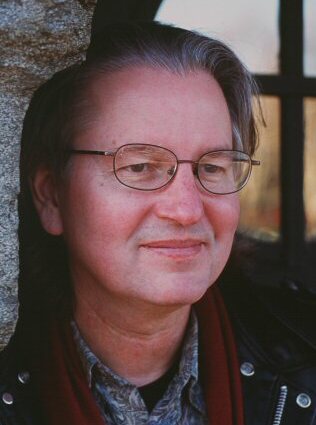
Michael Bruce Sterling is an American science fiction author known for his novels and short fiction and editorship of the Mirrorshades anthology. In particular, he is linked to the cyberpunk subgenre.

Cyberpunk is a subgenre of science fiction in a dystopian futuristic setting that tends to focus on a "combination of lowlife and high tech", featuring futuristic technological and scientific achievements, such as artificial intelligence and cyberware, juxtaposed with societal collapse, dystopia or decay. Much of cyberpunk is rooted in the New Wave science fiction movement of the 1960s and 1970s, when writers like Philip K. Dick, Michael Moorcock, Roger Zelazny, John Brunner, J. G. Ballard, Philip José Farmer and Harlan Ellison examined the impact of drug culture, technology, and the sexual revolution while avoiding the utopian tendencies of earlier science fiction.
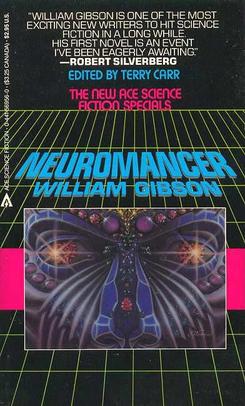
Neuromancer is a 1984 science fiction novel by American-Canadian writer William Gibson. Considered one of the earliest and best-known works in the cyberpunk genre, it is the only novel to win the Nebula Award, the Philip K. Dick Award, and the Hugo Award. It was Gibson's debut novel and the beginning of the Sprawl trilogy. Set in the future, the novel follows Henry Case, a washed-up hacker hired for one last job, which brings him in contact with a powerful artificial intelligence.
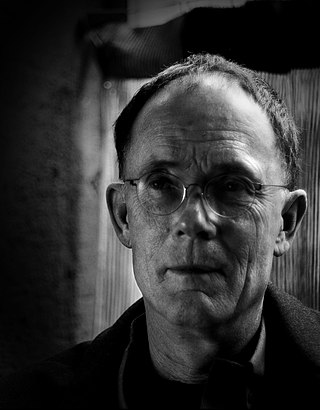
William Ford Gibson is an American-Canadian speculative fiction writer and essayist widely credited with pioneering the science fiction subgenre known as cyberpunk. Beginning his writing career in the late 1970s, his early works were noir, near-future stories that explored the effects of technology, cybernetics, and computer networks on humans—a "combination of lowlife and high tech"—and helped to create an iconography for the information age before the ubiquity of the Internet in the 1990s. Gibson coined the term "cyberspace" for "widespread, interconnected digital technology" in his short story "Burning Chrome" (1982), and later popularized the concept in his acclaimed debut novel Neuromancer (1984). These early works of Gibson's have been credited with "renovating" science fiction literature in the 1980s.
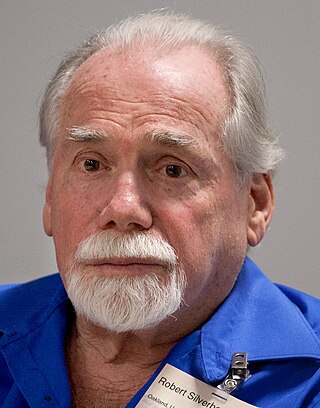
Robert Silverberg is an American author and editor, best known for writing science fiction. He is a multiple winner of both Hugo and Nebula Awards, a member of the Science Fiction and Fantasy Hall of Fame, and a Grand Master of SF. He has attended every Hugo Award ceremony since the inaugural event in 1953.

A romance novel or romantic novel generally refers to a type of genre fiction novel which places its primary focus on the relationship and romantic love between two people, and usually has an "emotionally satisfying and optimistic ending." Precursors include authors of literary fiction, such as Samuel Richardson, Jane Austen, and Charlotte Brontë.
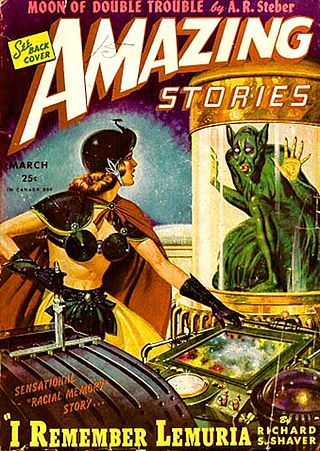
Richard Sharpe Shaver was an American writer and artist who achieved notoriety in the years following World War II as the author of controversial stories that were printed in science fiction magazines. In Shaver's story, he claimed that he had had personal experience of a sinister ancient civilization that harbored fantastic technology in caverns under the earth. The controversy stemmed from the claim by Shaver, and his editor and publisher Ray Palmer, that Shaver's writings, while presented in the guise of fiction, were fundamentally true. Shaver's stories were promoted by Ray Palmer as "The Shaver Mystery".
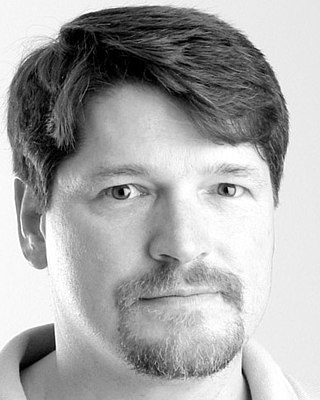
Bruce Bethke is an American author best known for his 1983 short story "Cyberpunk" which led to the widespread use of the term for the cyberpunk subgenre of science fiction. His novel, Headcrash, won the Philip K. Dick Award in 1995 for SF original paperback published in the US.
Since the advent of the cyberpunk genre, a number of derivatives of cyberpunk have become recognized in their own right as distinct subgenres in speculative fiction, especially in science fiction. Rather than necessarily sharing the digitally and mechanically focused setting of cyberpunk, these derivatives can display other futuristic, or even retrofuturistic, qualities that are drawn from or analogous to cyberpunk: a world built on one particular technology that is extrapolated to a highly sophisticated level, a gritty transreal urban style, or a particular approach to social themes.

Lesbian pulp fiction is a genre of lesbian literature that refers to any mid-20th century paperback novel or pulp magazine with overtly lesbian themes and content. Lesbian pulp fiction was published in the 1950s and 1960s by many of the same paperback publishing houses as other genres of fiction, including westerns, romances, and detective fiction. Because very little other literature was available for and about lesbians at this time, quite often these books were the only reference the public had for modeling what lesbians were. English professor Stephanie Foote commented on the importance of lesbian pulp novels to the lesbian identity prior to the rise of organized feminism: "Pulps have been understood as signs of a secret history of readers, and they have been valued because they have been read. The more they are read, the more they are valued, and the more they are read, the closer the relationship between the very act of circulation and reading and the construction of a lesbian community becomes…. Characters use the reading of novels as a way to understand that they are not alone."
The slipstream genre is a term denoting forms of speculative fiction that blends together science fiction, fantasy, and literary fiction or do not remain in conventional boundaries of genre and narrative, directly extending from the experimentation of the New Wave science fiction movement while also borrowing from fantasy, psychological fiction, philosophical fiction and other genres or styles of literature.
Social science fiction is a subgenre of science fiction, usually soft science fiction, concerned less with technology/space opera and more with speculation about society. In other words, it "absorbs and discusses anthropology" and speculates about human behavior and interactions.
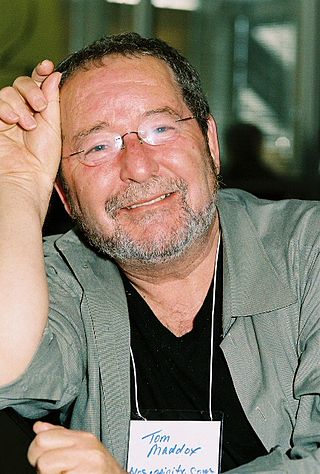
Tom Maddox was an American science fiction writer, known for his part in the early cyberpunk movement.

Science fiction is an important genre of modern Japanese literature that has strongly influenced aspects of contemporary Japanese pop culture, including anime, manga, video games, tokusatsu, and cinema.

The literary genre of science fiction is diverse, and its exact definition remains a contested question among both scholars and devotees. This lack of consensus is reflected in debates about the genre's history, particularly over determining its exact origins. There are two broad camps of thought, one that identifies the genre's roots in early fantastical works such as the Sumerian Epic of Gilgamesh. A second approach argues that science fiction only became possible sometime between the 17th and early 19th centuries, following the scientific revolution and major discoveries in astronomy, physics, and mathematics.

Mundane science fiction (MSF) is a niche literary movement within science fiction that developed in the early 2000s, with principles codified by the "Mundane Manifesto" in 2004, signed by author Geoff Ryman and "The Clarion West 2004 Class". The movement proposes "mundane science fiction" as its own subgenre of science fiction, typically characterized by its setting on Earth or within the Solar System; a lack of interstellar travel, intergalactic travel or human contact with extraterrestrials; and a believable use of technology and science as it exists at the time the story is written or a plausible extension of existing technology. There is debate over the boundaries of MSF and over which works can be considered canonical. Rudy Rucker has noted MSF's similarities to hard science fiction and Ritch Calvin has pointed out MSF's similarities to cyberpunk. Some commentators have identified science fiction films and television series which embody the MSF ethos of near-future realism.
Cyberpunk is a literary subgenre of science fiction.
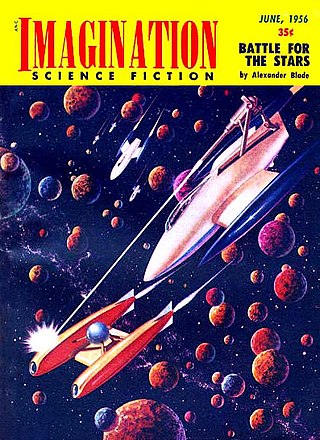
Space opera is a subgenre of science fiction that emphasizes space warfare, with use of melodramatic, risk-taking space adventures, relationships, and chivalric romance. Set mainly or entirely in outer space, it features technological and social advancements in faster-than-light travel, futuristic weapons, and sophisticated technology, on a backdrop of galactic empires and interstellar wars with fictional aliens, often in fictional galaxies. The term does not refer to opera music, but instead originally referred to the melodrama, scope, and formulaicness of operas, much as used in "horse opera", a 1930s phrase for a clichéd and formulaic Western film, and "soap opera", a melodramatic television series. Space operas emerged in the 1930s and continue to be produced in literature, film, comics, television, video games and board games.
Clandestine literature, also called "underground literature", refers to a type of editorial and publishing process that involves self-publishing works, often in contradiction with the legal standards of a location. Clandestine literature is often an attempt to circumvent censorship, prosecution, or other suppression. In academic study, such literature may be referred to as heterodox publications.
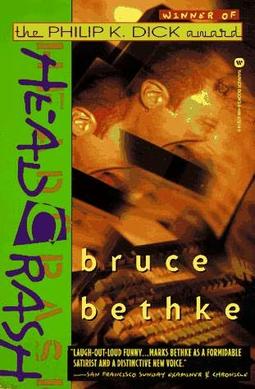
Headcrash is a satirical cyberpunk novel by Bruce Bethke, published in 1995 by Warner Books. It won the Philip K. Dick Award in 1995.















